Gli avvisi personalizzati e la visualizzazione dei dati consentono di identificare e prevenire rapidamente i problemi dell'infrastruttura.
Il monitoraggio dell'infrastruttura di rete è una parte vitale di un'azienda che funziona senza problemi. È possibile garantire le prestazioni solo se tutti i server sono attivi e funzionanti, gli switch e router funzionano correttamente e le virtual machine sono prive di errori. Monitorate ogni dispositivo collegato alla vostra rete con il software di monitoraggio PRTG Network Monitor di Paessler: un'unica soluzione per mantenervi sani di mente e per rendere sicuro e affidabile l'intero ambiente IT.
Quando i bug del software o hardware si guasta, bisogna muoversi rapidamente. PRTG è un osservatore che non riposa mai: il suo unico compito è quello di individuare i problemi e avvisarvi prima che diventino critici per l'azienda.
PRTG rileva rapidamente attività di rete che potrebbero indicare una minaccia alla sicurezza o un potenziale guasto del sistema. Con informazioni dettagliate sul traffico di rete, utilizzo della larghezza di bandae sulle prestazioni dei dispositivi, è facile isolare i problemi e intervenire in modo mirato per una risoluzione più rapida.
Ottenete gli avvisi più adatti alla vostra infrastruttura. Con gli oltre 250 sensori incorporati nel PRTG sensori incorporati e le potenti API, è possibile personalizzare facilmente la configurazione di monitoraggio in base alle esigenze specifiche dell'organizzazione.
PRTG consente di modificare i singoli sensori e gli avvisi con pochi clic. È possibile integrarsi con altri sistemi, configurare automazioni delle attività e ottenere approfondimenti in tempo reale che consentono di intervenire su potenziali problemi prima che si aggravino.
Dite addio all'accozzaglia di strumenti di monitoraggio male assortiti e date il benvenuto al nostro software di monitoraggio di rete all-in-one software di monitoraggio della rete. PRTG aiuta a individuare i punti deboli e rende le cose meno complicate, sostituendo i vari strumenti di monitoraggio e riunendo i dati di monitoraggio in un unico dashboard.
Il risultato? Una rete più facile da gestire e più difficile da decifrare.
Diagnosticare i problemi di rete monitorando continuamente l'infrastruttura IT – indipendentemente dal fatto che sia on-premises o che abbia un'infrastruttura cloud. Mostra tempo di risposta larghezza di banda, utilizzo della CPU e altre metriche di performance dell'infrastruttura in tempo reale. Visualizzate i dati di monitoraggio in grafici e dashboard chiari per identificare più facilmente i problemi. Ottenete la Panoramica necessaria per risolvere tutti i problemi dell'infrastruttura di rete.
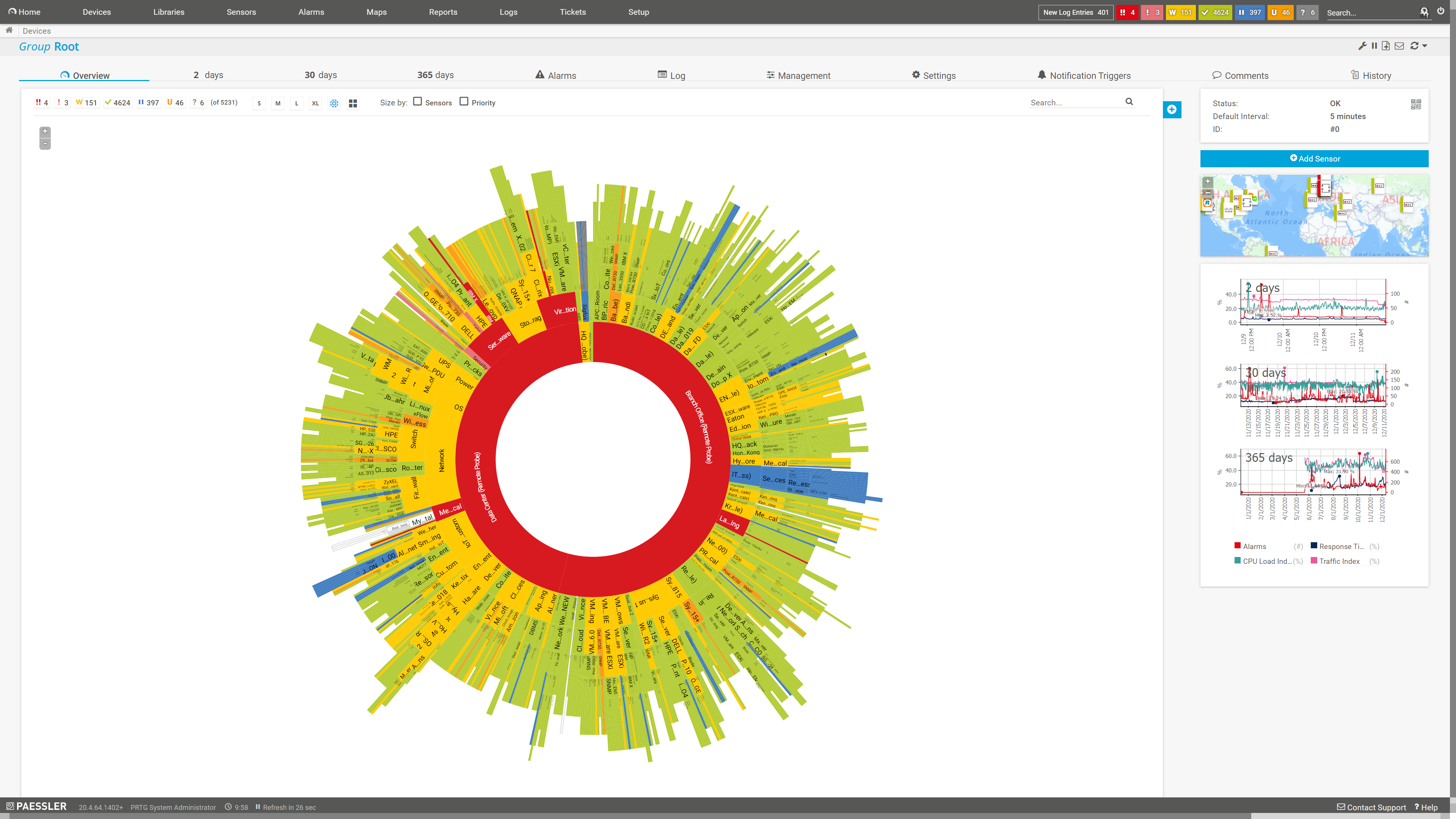
Vista sunburst dell'albero dei dispositivi
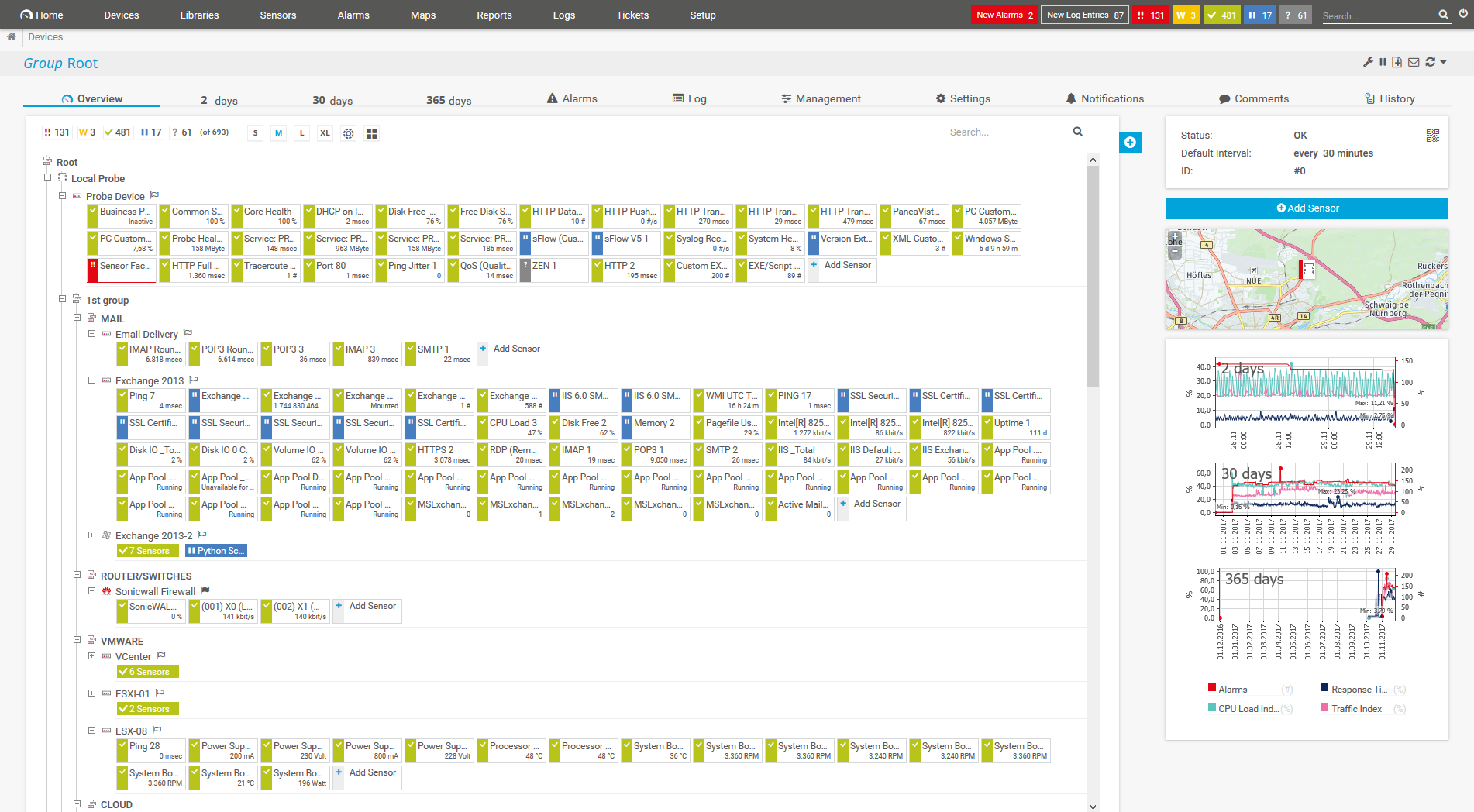
Albero dei dispositivi dell'intera configurazione di monitoraggio
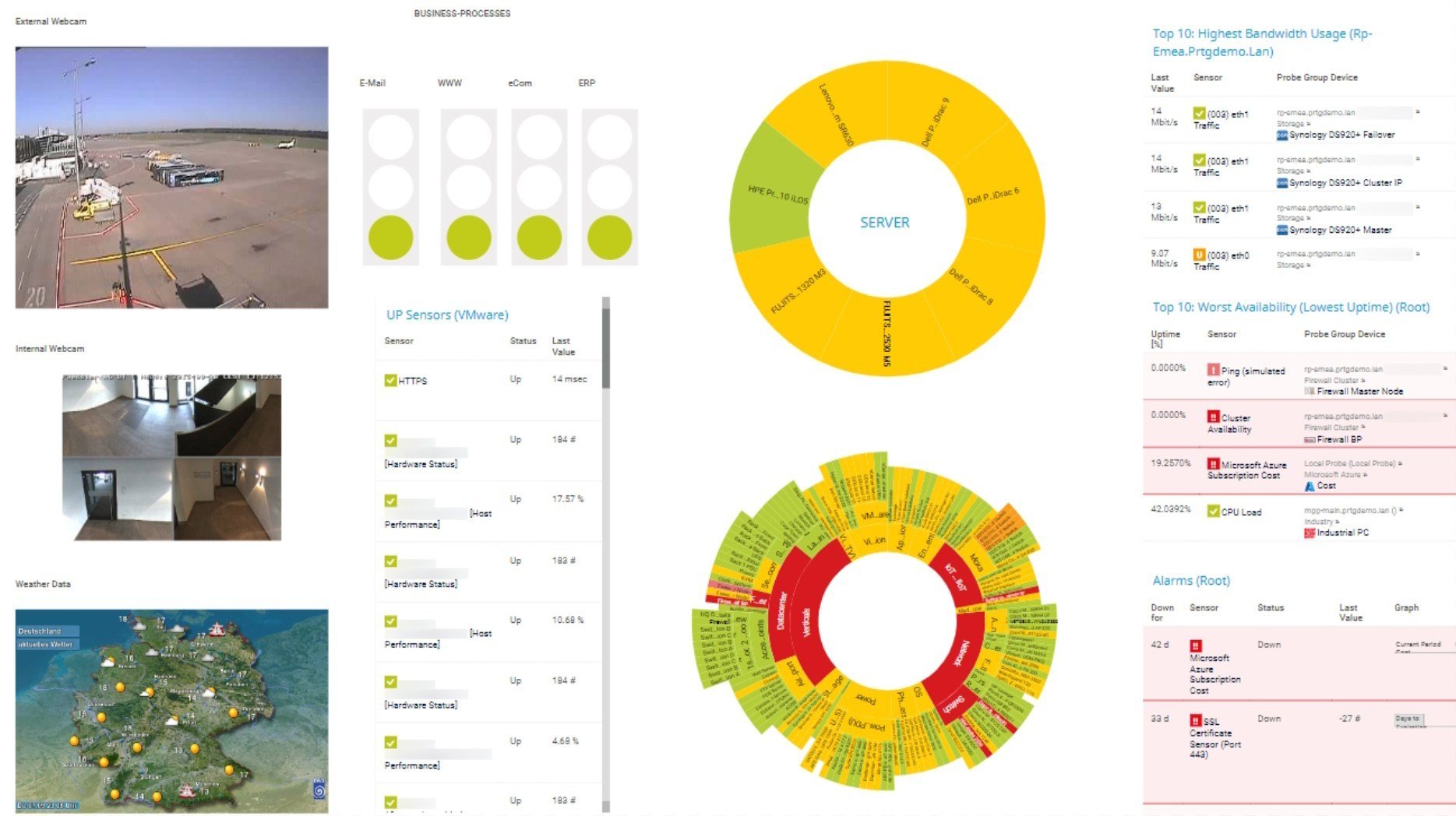
Dashboard PRTG personalizzato per tenere sotto controllo l'intera infrastruttura IT

Vista sunburst dell'albero dei dispositivi

Albero dei dispositivi dell'intera configurazione di monitoraggio
PRTG offre un monitoraggio completo per l'intera infrastruttura IT, compresi i server, ambienti virtuali servizi cloud e tutti i tipi di dispositivi di rete come server, router, switch o firewall.
Questo approccio di ampio respiro consente di individuare qualsiasi anello debole e di individuare immediatamente i potenziali colli di bottiglia.
PRTG tiene sotto controllo tutti i VIP della vostra rete: tempi di attività, tempi di inattività salute del sistema, utilizzo della larghezza di banda, server virtuali, applicazioni e altro ancora.
IT analizza anche il traffico di rete, controlla la qualità del servizio e individua qualsiasi comportamento strano tra dispositivi e utenti.
Con il monitoraggio dell'infrastruttura in tempo reale del PRTG, siete sempre aggiornati sull'andamento della vostra rete, sia che siate alla vostra scrivania o in spiaggia.
Grafici e dashboard mostrano lo stato dei server, mentre la applicazione mobile e gli avvisi automatici vi tengono pronti ad affrontare i problemi in qualsiasi momento e ovunque.
L'installazione di PRTG è un gioco da ragazzi. Come soluzione agentless consente di risparmiare tempo e fatica, permettendo al team IT di concentrarsi su attività più critiche.
Il sistema di allarme integrato di PRTG invia notifiche istantanee via e-mail, SMS o push al primo segno di problema, aiutando a prevenire o ridurre al minimo i guasti del sistema.
PRTG è dotato di oltre 250 tipi di sensori nativi per il monitoraggio dell'intero ambiente on-premises, cloud e cloud ibrido. Dai un'occhiata ad alcuni esempi qui sotto!
Consulta il manuale di PRTG per un elenco di tutti i tipi di sensore disponibili.
Gli avvisi personalizzati e la visualizzazione dei dati consentono di identificare e prevenire rapidamente i problemi dell'infrastruttura.
PRTG si configura in pochi minuti e può essere utilizzato su un'ampia gamma di dispositivi mobili.
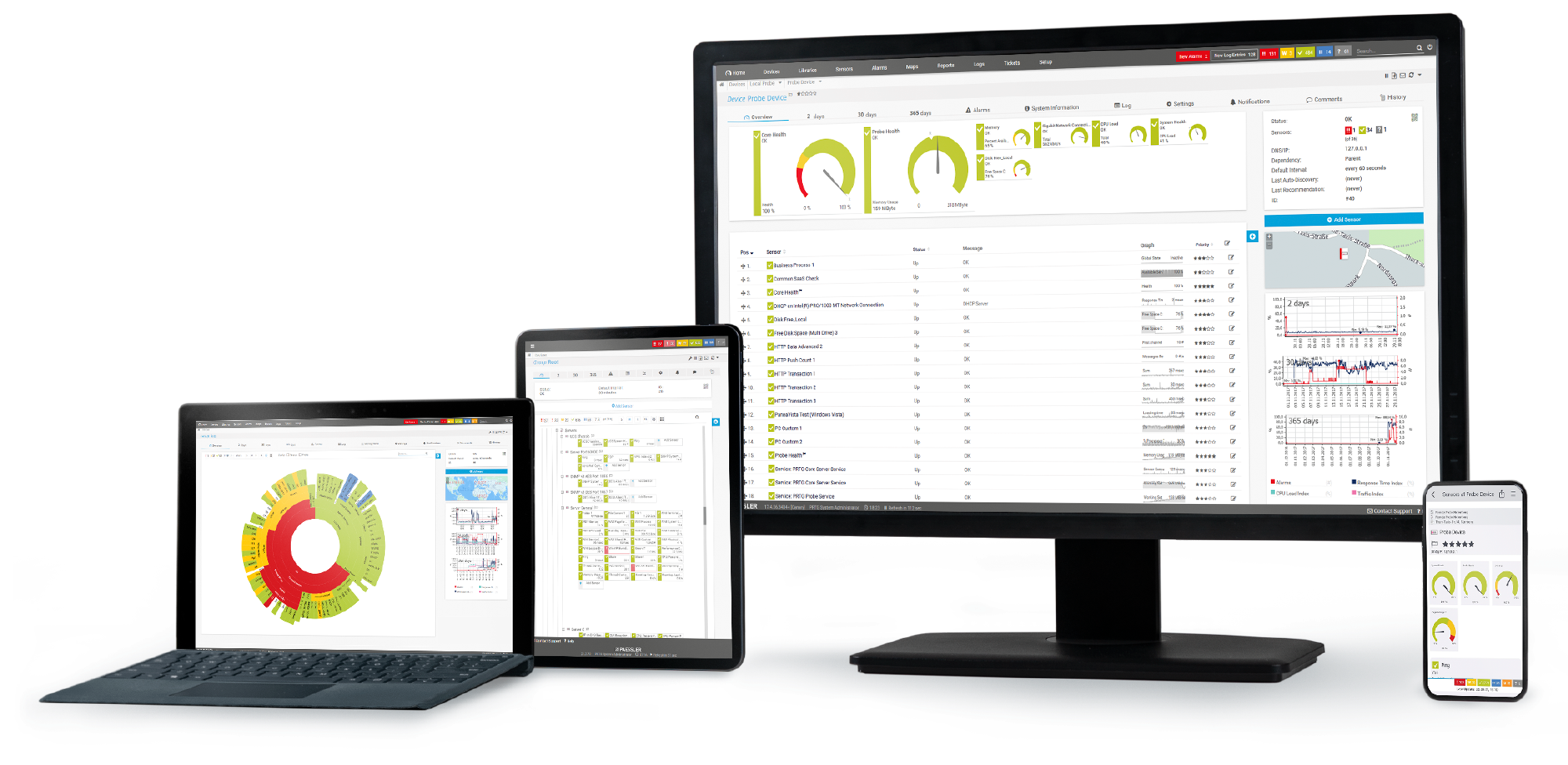
“Eccellente strumento per un monitoraggio dettagliato. Gli avvisi e le notifiche funzionano perfettamente. L'aggiunta dei dispositivi è intuitiva e la configurazione iniziale del server è molto semplice. ...acquistatelo tranquillamente se desiderate monitorare un vasto panorama di rete.”
Grazie alla collaborazione con fornitori IT innovativi, Paessler libera sinergie per creare nuovi e ulteriori vantaggi per i suoi clienti.
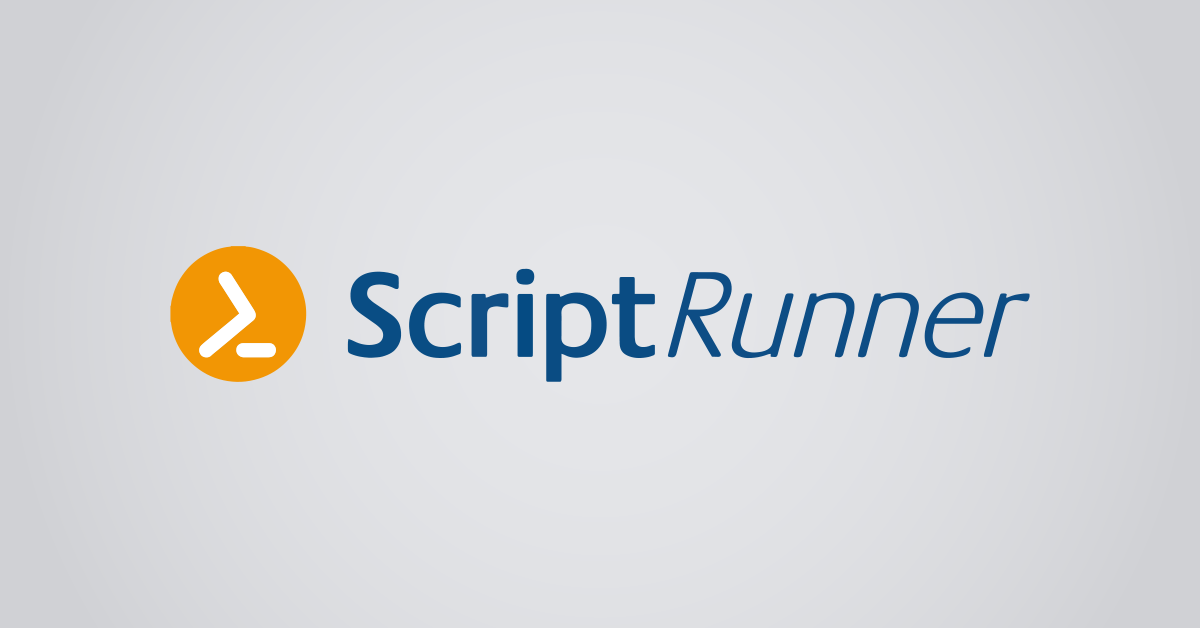
Con ScriptRunner Paessler integra una potente piattaforma di automazione degli eventi in PRTG Network Monitor.

Integrando PRTG con Martello iQ, puoi aggiungere un livello di analisi veloce per migliorare i tempi di attività, visualizzare il tuo ambiente IT e integrare tutti i tuoi sistemi IT in un unico pannello di vetro.

Siemon e Paessler uniscono la tecnologia degli edifici intelligenti e il monitoraggio avanzato e fanno sì che la tua visione di edifici e data center intelligenti diventi realtà.
Notifiche in tempo reale significano una risoluzione più rapida dei problemi, in modo da poter intervenire prima che si verifichino problemi più gravi.
Software di monitoraggio della rete – Versione 24.4.102.1351 (November 12th, 2024)
Disponibile il download della versione per Windows e della versione cloud-based PRTG Hosted Monitor
Inglese, tedesco, spagnolo, francese, portoghese, olandese, russo, giapponese e cinese semplificato
Dispositivi di rete, larghezza di banda, server, applicazioni, ambienti virtuali, sistemi remoti, IoT e molto altro
Scegli l'abbonamento a PRTG Network Monitor più adatto a te
Il monitoraggio dell'infrastruttura di rete è il processo di supervisione e gestione dei componenti hardware e software di una rete per garantirne prestazioni, disponibilità e sicurezza ottimali. Ciò comporta il monitoraggio continuo di vari elementi dell'infrastruttura di rete, tra cui server, router, switch, firewall e altri dispositivi di rete, nonché le applicazioni e i servizi in esecuzione su di essi.
Gli aspetti chiave del monitoraggio dell'infrastruttura di rete includono:
Il monitoraggio dell'infrastruttura di rete è fondamentale per garantirne prestazioni, sicurezza e affidabilità ottimali. Ecco alcuni motivi per cui è necessario monitorare l'infrastruttura di rete:
PRTG copre ambienti fisici, virtuali e cloud, garantendo un monitoraggio completo dell'intera infrastruttura. IT si integra perfettamente con i vari ambienti, fornendo una visione unificata della salute della rete.
Assolutamente sì! PRTG è adattabile a qualsiasi dimensione dell'infrastruttura, da pochi dispositivi a un ambiente su larga scala. Licenze e prezzi flessibili garantiscono la scalabilità. Sia che la vostra rete sia in crescita o che dobbiate ridimensionarla, PRTG si adatta alle vostre esigenze.
Il PRTG non è un software dedicato alla sicurezza di rete, ma integra le misure di sicurezza esistenti. Assicuratevi, ad esempio, che sulla vostra rete sia installato un software antivirus per proteggervi da malware e virus. PRTG si concentra sul monitoraggio e sul rilevamento di anomalie che potrebbero indicare una minaccia alla sicurezza, fornendo un ulteriore livello di difesa.
In PRTG, i “sensori” sono gli elementi base del monitoraggio. Un sensore monitora solitamente un valore misurato nella tua rete (ad esempio, il traffico di una porta switch, il carico della CPU di un server o lo spazio libero di un’unità disco). In media, occorrono circa 5-10 sensori per ogni dispositivo o un sensore per ogni porta switch.
Paessler ha condotto prove in oltre 600 dipartimenti IT in tutto il mondo per mettere a punto il suo software di monitoraggio di rete più vicino alle esigenze dei sysadmin. Il risultato è che più del 95% degli intervistati consiglierebbe PRTG – o lo ha già fatto.
Paessler PRTG è utilizzato da aziende di tutte le dimensioni. Gli amministratori di sistema adorano PRTG perché rende il loro lavoro molto più semplice.
Ampiezza di banda, server, ambienti virtuali, siti Web, servizi VoIP - PRTG tiene d'occhio la tua intera rete.
Tutti hanno esigenze di monitoraggio diverse. Ecco perché ti lasciamo provare PRTG gratuitamente. Inizia oggi stesso la tua prova.